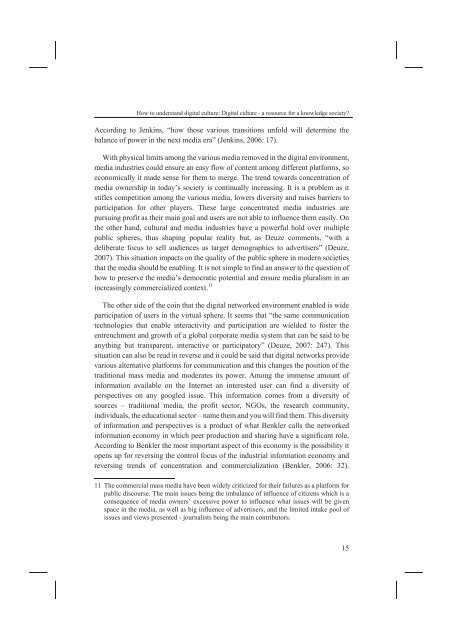D:\Documents and Settings\Ana\My Documents\Biserka-knjiga ...
D:\Documents and Settings\Ana\My Documents\Biserka-knjiga ...
D:\Documents and Settings\Ana\My Documents\Biserka-knjiga ...
You also want an ePaper? Increase the reach of your titles
YUMPU automatically turns print PDFs into web optimized ePapers that Google loves.
How to underst<strong>and</strong> digital culture: Digital culture - a resource for a knowledge society?<br />
According to Jenkins, “how those various transitions unfold will determine the<br />
balance of power in the next media era” (Jenkins, 2006: 17).<br />
With physical limits among the various media removed in the digital environment,<br />
media industries could ensure an easy flow of content among different platforms, so<br />
economically it made sense for them to merge. The trend towards concentration of<br />
media ownership in today’s society is continually increasing. It is a problem as it<br />
stifles competition among the various media, lowers diversity <strong>and</strong> raises barriers to<br />
participation for other players. These large concentrated media industries are<br />
pursuing profit as their main goal <strong>and</strong> users are not able to influence them easily. On<br />
the other h<strong>and</strong>, cultural <strong>and</strong> media industries have a powerful hold over multiple<br />
public spheres, thus shaping popular reality but, as Deuze comments, “with a<br />
deliberate focus to sell audiences as target demographics to advertisers” (Deuze,<br />
2007). This situation impacts on the quality of the public sphere in modern societies<br />
that the media should be enabling. It is not simple to find an answer to the question of<br />
how to preserve the media’s democratic potential <strong>and</strong> ensure media pluralism in an<br />
increasingly commercialized context. 11<br />
The other side of the coin that the digital networked environment enabled is wide<br />
participation of users in the virtual sphere. It seems that “the same communication<br />
technologies that enable interactivity <strong>and</strong> participation are wielded to foster the<br />
entrenchment <strong>and</strong> growth of a global corporate media system that can be said to be<br />
anything but transparent, interactive or participatory” (Deuze, 2007: 247). This<br />
situation can also be read in reverse <strong>and</strong> it could be said that digital networks provide<br />
various alternative platforms for communication <strong>and</strong> this changes the position of the<br />
traditional mass media <strong>and</strong> moderates its power. Among the immense amount of<br />
information available on the Internet an interested user can find a diversity of<br />
perspectives on any googled issue. This information comes from a diversity of<br />
sources – traditional media, the profit sector, NGOs, the research community,<br />
individuals, the educational sector – name them <strong>and</strong> you will find them. This diversity<br />
of information <strong>and</strong> perspectives is a product of what Benkler calls the networked<br />
information economy in which peer production <strong>and</strong> sharing have a significant role.<br />
According to Benkler the most important aspect of this economy is the possibility it<br />
opens up for reversing the control focus of the industrial information economy <strong>and</strong><br />
reversing trends of concentration <strong>and</strong> commercialization (Benkler, 2006: 32).<br />
11 The commercial mass media have been widely criticized for their failures as a platform for<br />
public discourse. The main issues being the imbalance of influence of citizens which is a<br />
consequence of media owners’ excessive power to influence what issues will be given<br />
space in the media, as well as big influence of advertisers, <strong>and</strong> the limited intake pool of<br />
issues <strong>and</strong> views presented - journalists being the main contributors.<br />
15



